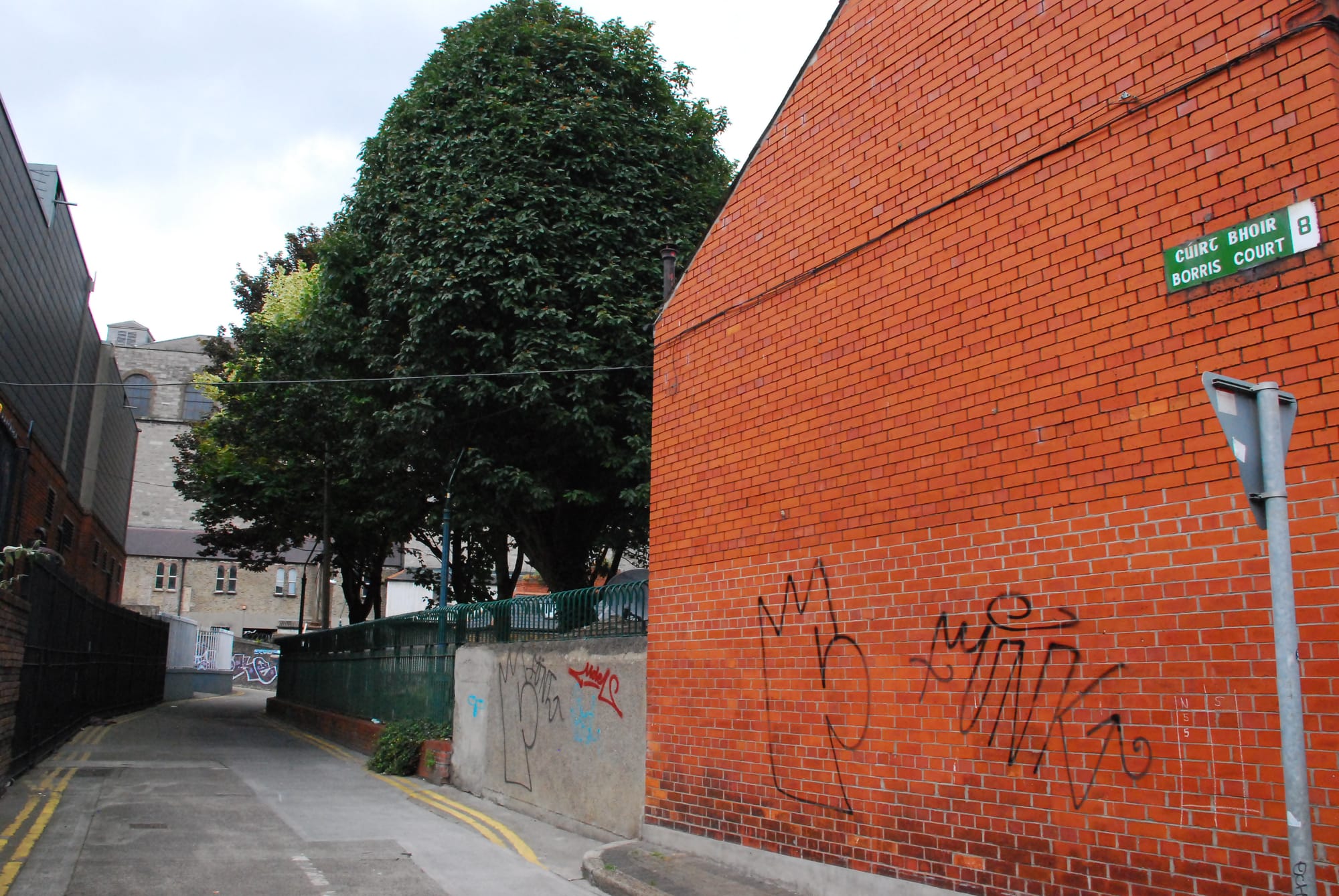Nobody caught illegally dumping yet by new north inner-city CCTV
But the scheme is a success, said a council official's report, as that shows the cameras are a deterrent.
Local residents say there’s been an uptick in strewn needles and antisocial behaviour around the homeless and drugs service centre. But there’s no easy solution to that.

Residents, local business people, politicians and Gardaí all gathered last Thursday afternoon in Marshalsea Court, on Merchant’s Quay.
The subject of discussion: Merchant’s Quay Ireland (MQI), the riverside homeless and drugs service.
Some residents and businesses say that people who visit MQI are leaving needless strewn along back alleys in the neighbourhood, passing out in inappropriate spots, and defecating in public. Things have been getting worse in the past year, they say.
They wanted answers and action from MQI chief executive Tony Geoghegan, but it’s unclear what the solution might be. MQI owns the building it operates out of and doesn’t plan to move.
Should it reduce the number of people it is serving? Should nearby Borris Court – which local residents complain is as a hotspot for shooting up – be gated off?
Might growing discontent put paid to the idea of putting a medically supervised injection centre on the site? Or is that idea already dead anyway?
“I’ve been here for two and a half years and it’s been getting worse,” says Ronan Watson of Four Courts Hostel along the quays. “It was bad then, but it’s out of control now.”
Each day outside MQI, homeless people and addicted people – and some people who are both – queue outside for a bed for the night, or to use the needle-exchange service.
Last Thursday’s meeting was chaired by Fine Gael’s Catherine Byrne, a Dublin South Central TD, who is Minister of State for Communities and National Drugs Strategy.
Locals who attended vented their frustration with, among other things, the prevalence of needles found nearby. The solution, some argued, is to erect gates at Borris Court to keep people from going in there and shooting up.

On 9 June, Byrne wrote to Dublin City Council Chief Executive Owen Keegan on behalf of residents of Borris Court, requesting the closure.
It was, she said, a laneway used “to openly deal and inject illegal substance”, and one which “addicts … use as a public toilet”.
Gates may well be erected by the council at Borris Court in the coming weeks or months.
“A statutory procedure known as an extinguishment of a right of way needs to take place in advance of restricting public access,” the council’s press office said by email. “Once this process is approved, the city council will consider all the available options, including gates for restricting public access.”
The council is in the process of seeking a quotation for gates, as well considering funding the closure and subsequent maintenance.
Local resident Barry Roche said residents’ quality of life has been affected by what he said is growing antisocial behaviour in the area. But he says he knows MQI isn’t going to relocate anytime soon.
“Merchant’s Quay’s not going to leave in the morning, that’s the reality,” Roche says. “It’s kicking a political football around and nobody wants to take responsibility.”
“The government have not put money into services properly and the location is not suitable,” he says. “But the question is where do you set up a service?”
MQI hasn’t considered relocation, Geoghegan said. “We own the premises and we’re there a long time,” he said. Our people are low-threshold, who don’t fit into other services and obviously people get drawn into the city centre.”
No one wants to live next to places that provide services to people with addictions and people without homes, but residents should expect to see such services in city-centre locations like Merchant’s Quay.
“If you’re in any city centre the levels of drug abuse and homelessness are increased,” he says. “That doesn’t make it okay, but that is the reality.”
Relocating a project like MQI, he says, would prove difficult given the centre’s location and the fact that certain locations simply won’t “pull people into treatment”.
Between 2,500 and 3,000 people avail of the services at MQI’s riverbank centre each year, according to Geoghegan.
Independent Dublin City Councillor Mannix Flynn says that’s too many “Merchant’s Quay’s not fit for purpose,” he says. “The impact on the neighborhood is catastrophic.”
Flynn says that the situation has gotten out of hand. “If you over-pack a cinema, if you over-pack a restaurant, if you over-pack a theatre, if you over-pack a house there’s consequences,” he says.
“Mr. Tony Geoghegan and the Merchant’s Quay board have over-packed Merchant’s Quay and they’re no longer capable of actually containing or dealing with the issues or delivering a service, both to their own clients and to the local community,” Flynn says.
Last year, MQI moved its steroid services out to Capel Street. That was meant to relieve some of the pressure on the Merchant’s Quay centre, but Watson of the Four Courts Hostel said that hadn’t solved the problems there.
“It doesn’t seem to be going away,” says Watson of Four Courts Hostel. “The only way they can do anything is to reduce numbers, have a third of the number of people.”
On a recent Monday afternoon, half a dozen people wait around outside MQI’s riverbank centre for the next availability. Most pass the time chatting. Others bum smokes.

One, his hand running bloody, is sent packing until he sees a doctor. “This place is shit!” he yells, walking off down the quays.
Another tells me he’s been homeless for six months. After a stint as a kitchen porter in Waterford, he moved to Dublin and soon became homeless.
From Somalia originally, he’s availed of MQI’s services for six months, and says he’s witnessed little enough trouble in the area – the odd fight, but that’s it.
Sergeant Michael Nagle of An Garda Síochána noted at Thursday’s meeting that two stabbings, both between clients of MQI, were the most serious incidents in recent months.
Mannix Flynn, the city councillor, said MQI’s riverside centre will more than likely become a medically supervised injection centre.
“Again that’s going to cause catastrophe,” Flynn says. “You’re going to be attracting people into a neighborhood that’s already saturated with [drug] services.”
Geoghegan of MQI says the centre has expressed its interest in providing this service, but he doubts it will happen. He says it seems like the government has given up on creating medically supervised injection rooms.
The Misuse of Drugs (Amendment) Bill originally proposed the introduction of medically supervised injection centres and the heads of bill were approved by the cabinet in December.
But then Labour’s Aodhán Ó Ríordáin, who was minister of state overseeing national drugs strategy, lost his Dáil seat in the 2016 general election. He had been a supporter of medically supervised injection centres, and decriminalisation of the possession of small amounts of drugs.
Since then, he has raised concerns in TheJournal.ie that the new(ish) government has given up on the injection centres, although Byrne, who is now overseeing national drugs strategy told the Irish Times this month that she expects the first one to open in Dublin city centre in the spring.
In any case, says Geoghegan, MQI wants the recent issues resolved. “We’re committed to trying to work with the neighbours,” he says. “We might have a different end-game in that their preferred outcome would be that the service was closed.”